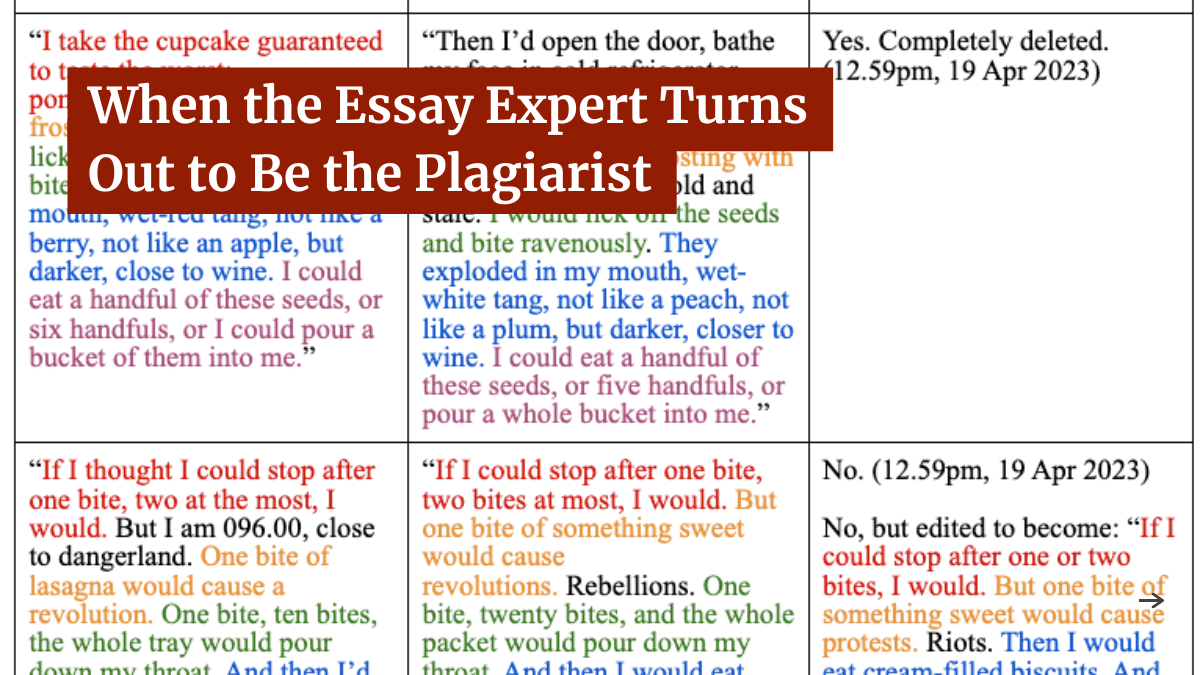Celebrity TikTok Essay Expert Accused of Plagiarism

At just 19 years old, Singaporean English tutor Brooke Lim has carved out a prominent and lucrative niche for herself.
On TikTok, she is known as @sugaresque, and she has amassed more than 183,000 followers, who come to her for tips and help on writing English-language essays.
She parlayed that fame and notoriety into her own tutoring service, Classicle Club. This has made her something of a media darling in the space, and, according to news reports, has netted her over $100,000 in revenue.
However, this popularity is now in jeopardy. A video uploaded to TikTok by a user with the name of @sugaresqueessay, highlights many instances of plagiarism in a recent essay published by Lim on both her Telegram channel and her website.
That video has been backed up by a Google Doc, which accuses Lim of plagiarizing from at least 5 different books and 8 different articles. The essay, entitled On Being Afraid of Eating, was supposedly a deeply personal piece about Lim’s own struggles with eating disorders.
Lim, initially, attempted to deny or minimize the plagiarism, saying that it was limited to an excerpt by her 14-year-old self. However, as Lim noticed and called out, Lim eventually published an apology video, where she admitted to the plagiarsim but said that it was written in a “personal capacity” that was not intended for any academic or commercial purpose.
However, that apology has not gone over well with her fans. A Reddit thread about the scandal says that her apology is incomplete and that she, of all people, should have known better. Comments to her apology video were also overwhelmingly negative.
Some of those detractors have launched a petition asking UCLA, which recently extended an admissions offer to her, to check her admissions papers for plagiarism. UCLA has not responded to the news story or the petition.
Meanwhile, the allegations of plagiarism have begun to fall outside the essay in question, with readers finding instances of copied texts in various Classicle Club works. This includes essays provided by the company and the text on the Club’s website itself.
Whether this will lead to the downfall of Lim or Classicle Club remains to be seen. However, what is clear is that Lim’s reputation has taken a significant hit and her fellow Singaporeans are not going to let her forget or walk away from this.
That said, it’s worth taking a moment to examine the actual allegations of plagiarism as well as look at Lim’s apology.
Understanding the Plagiarism and Apology
The plagiarism itself is easy to understand and very well laid out in the Google Doc.
Looking at the original essay’s allegations for a moment, it’s a pattern that should be very familiar to long-time and even short-time readers of this site. It’s a pattern of plagiarism similar to what we saw with Jumi Bello and more recently with the David Agus plagiarism scandal (or at least his ghostwriter).
In short, it’s a type of plagiarism that involves lifting from a large number of works, usually in short passages that are often heavily rewritten. Some write this way in a mistaken belief that this is how paraphrasing is done.
It’s a mistake that is easily avoided by adopting a cleanroom approach to writing. However, it’s obvious that Lim is not practicing that approach in her writing, or at least didn’t with this essay. That makes this kind of plagiarism virtually inevitable.
Lim’s apology, or rather apologies, also didn’t help things. First, they were an attempt to shirk responsibility or minimize the wrongdoing. But even when she did try fully apologize, she misled and misinformed.
For example, she claimed that the essay was not for any academic or commercial purpose. While she is right that it wasn’t behind a paywall or used to push advertising, it was published on her profiles that she uses to promote her tutoring business.
That would be akin to me saying that this article is not for any commercial gain even though, quite plainly, one of the reasons I operate this site is to promote my consulting and expert witness services. I may not be monetizing it directly, but I do gain benefit from it.
However, the worst element in this is that the allegations are slowly spreading to other work by Lim, including documents related to her tutoring business. She denies these allegations though, once again, the Google Doc makes a clear case that plagiarized text exists in those documents, even if it is not as much as is in the original essay.
This paints a picture of a pattern in the way that Lim works and, most likely, a pattern that has been worsening for at least some time.
The Problem with Brooke Lim
The problem with Lim is simple: If anyone should have known better, it should have been her.
Lim promoted herself as an expert on writing English-language essays. To that end, she is a talented writer and speaker. However, she either never learned or forgot one of the most important fundamentals of writing, how to incorporate, or not incorporate, the work of others in your projects.
If Lim were a regular college student and this was an essay assignment for a class, it would likely not be a big deal. If this were her first offense, she would likely fail the assignment and have to do some kind of remedial work to learn how to write and cite better. After that, it would likely be forgotten.
But Lim, through her social media presence, positioned herself as an expert on essay writing. That positioning, in turn, was very lucrative for her both monetarily and in terms of influence. However, that image has now been shattered, with many of her supporters feeling betrayed. That is an understandable feeling.
This type of plagiarism is usually either caused by a malicious intent to plagiarize and hide it or by someone whose approach to writing is deeply flawed and should not be taught to anyone else.
It’s difficult to say which of these outcomes looks worse for Lim. She’s either someone who maliciously plagiarized, likely on multiple works, or is someone who, despite claiming expertise, had a fundamentally flawed approach to writing.
Neither look great nor bode well for her future as a tutor. However, it remains to be seen just how strong and sustained the backlash against her will actually be.
Bottom Line
Many authors, in particular young authors, mistakenly believe that you can paraphrase something or “make it your own” by editing other text that has been pasted in.
That is simply not the case.
Even if the editing is perfect, it’s still not original writing. It’s just editing the words of someone else. It’s not original writing, and it’s not even paraphrasing. It’s just editing.
However, that’s the problem with this kind of “writing”. It’s not likely to be detected immediately. Authors that pick up this bad habit can often do it for months or years without anyone being the wiser.
The first problem is that, even with the best of editing, traces of the original are left behind. Someone, looking closely enough, can usually find the source.
But the bigger problem is what happens over time. Authors become more relaxed about editing, leave longer passages untouched, and generally be sloppier about manipulating the source material.
Then, as with this case, you eventually leave too much of the source material behind, and it’s easily detected and traced, prompting a review of all previous material.
It’s a pattern that we’ve seen again and again. It’s also a pattern that is easily avoided. However, it seems unlikely that anyone will learn that process from Lim or her tutoring service.
Want to Reuse or Republish this Content?
If you want to feature this article in your site, classroom or elsewhere, just let us know! We usually grant permission within 24 hours.
